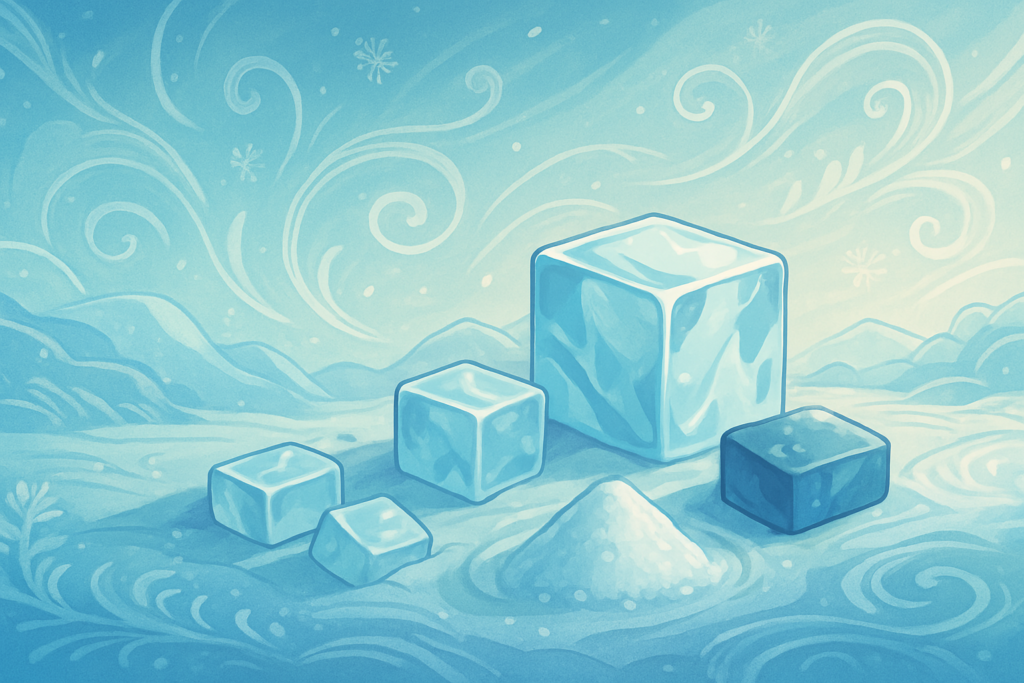Have you ever found yourself in a sweltering Japanese summer, desperately wanting to ask for extra ice in your drink but lacking the vocabulary? Or perhaps you’ve been fascinated by Japan’s intricate ice sculptures and winter festivals but couldn’t discuss them in the local language? Understanding the Japanese word for ice is not just about learning another vocabulary item—it’s about unlocking cultural experiences from cooling summer treats to winter traditions.
As someone who has guided hundreds of language learners through essential Japanese vocabulary, I’ve seen how mastering everyday words like the Japanese word for ice can transform hesitant beginners into confident communicators. Let’s dive into everything you need to know about how to say, write, and use “ice” in Japanese!
What is the Japanese Word for Ice?
The primary Japanese word for ice is 氷 (こおり), pronounced as “kōri.” This kanji character belongs to the JLPT N5 level, making it one of the fundamental weather and nature-related terms you’ll want to master early in your language journey.
Writing and Reading the Japanese Word for Ice
The Japanese word for ice can be written in several ways:
- 氷 – This is the kanji character
- こおり – This is the hiragana reading (kōri)
- コオリ – This is the katakana reading (kōri)
The kanji 氷 is composed of the radical for “water” (氵) with a distinctive shape that visually represents frozen water. Learning to recognize this character is valuable for anyone studying Japanese, as it appears frequently in weather forecasts, restaurant menus, and everyday conversations during summer.
Just like we explored in our Japanese Kana Symbols guide, understanding how to read and write basic nature words like the Japanese word for ice builds a strong foundation for language fluency.
Common Phrases Using the Japanese Word for Ice
To help you use the Japanese word for ice in real-life situations, here are some practical phrases:
Ordering Drinks
- 氷なしでお願いします。 (こおり なしで おねがいします。)
- Kōri nashi de onegaishimasu.
- No ice, please.
- 氷を多めにお願いします。 (こおりを おおめに おねがいします。)
- Kōri o ōme ni onegaishimasu.
- Extra ice, please.
- 氷は入れないでください。 (こおりは いれないで ください。)
- Kōri wa irenaide kudasai.
- Please don’t add ice.
Describing Ice Conditions
- 氷が溶けています。 (こおりが とけています。)
- Kōri ga tokete imasu.
- The ice is melting.
- 道路が氷で滑りやすいです。 (どうろが こおりで すべりやすいです。)
- Dōro ga kōri de suberiyasui desu.
- The road is slippery with ice.
- 湖の表面が氷で覆われています。 (みずうみの ひょうめんが こおりで おおわれています。)
- Mizuumi no hyōmen ga kōri de ōwarete imasu.
- The lake’s surface is covered with ice.
Mastering these everyday phrases related to the Japanese word for ice will help you navigate both summer refreshments and winter challenges with confidence, similar to how our Complete Guide to JLPT N5 Exam Preparation helps students master essential vocabulary systematically.
Different Types of Ice in Japanese
The Japanese language has several ways to describe different forms of ice, reflecting the country’s attention to detail:
| Japanese | Romaji | English |
|---|---|---|
| 氷 | kōri | ice (general term) |
| 氷のキューブ | kōri no kyūbu | ice cube |
| 氷河 | hyōga | glacier |
| 流氷 | ryūhyō | drift ice |
| かき氷 | kakigōri | shaved ice dessert |
| あられ | arare | hail |
| 霜 | shimo | frost |
| つらら | tsurara | icicle |
This variety shows the richness of Japanese vocabulary related to ice, similar to how our Essential Japanese Vocabulary PDF highlights the nuances of everyday terms.
Want to explore Japan’s culture?
Discover Japan’s rich culture, traditions, and hidden gems with our expertly crafted guides. Get insider tips on travel, food, and history. All for free!
Cultural Significance of Ice in Japanese Traditions
The Japanese word for ice connects to several important cultural practices and traditions:
Kakigōri: Japanese Shaved Ice
かき氷 (kakigōri) is a beloved summer treat made from finely shaved ice flavored with sweet syrups. Dating back to the Heian Period (794-1185 CE), this dessert has evolved into a sophisticated culinary art with specialty shops offering seasonal flavors from matcha to mango.
Yokan: Winter Ice Preservation
Before modern refrigeration, the Japanese preserved winter ice in special storehouses called 氷室 (himuro) for use during summer. This practice was so important that there’s even a traditional ceremony called 氷室祭 (Himuro Matsuri) celebrating ice preservation.
Ice Sculptures and Festivals
Northern Japanese regions like Hokkaido host famous ice festivals featuring elaborate sculptures created from massive blocks of ice, known as 氷の彫刻 (kōri no chōkoku).
Understanding these cultural connections enhances your appreciation of the Japanese word for ice beyond mere vocabulary, similar to how our Temple in Japanese guide explores the deeper cultural context of spiritual vocabulary.
Compound Words Using the Japanese Word for Ice
The kanji for ice (氷) appears in many compound words, expanding your vocabulary:
- 製氷機 (せいひょうき) – seihyōki – ice maker
- 冷氷 (れいひょう) – reihyō – refrigerated ice
- 氷山 (ひょうざん) – hyōzan – iceberg
- 氷上 (ひょうじょう) – hyōjō – on ice (for sports)
- 氷点下 (ひょうてんか) – hyōtenka – below freezing point
Learning these compounds builds on your understanding of the basic Japanese word for ice, creating a more comprehensive vocabulary network.
Quick Tips for Remembering the Japanese Word for Ice
To help you memorize 氷 (kōri) effectively:
- The kanji 氷 visually represents frozen water with its water radical
- Practice writing it using the techniques in our JLPT N5 Kanji List guide
- Create a mnemonic: “The water (氵) is so cold it’s frozen into KŌRIcles” (like popsicles)
- Use flashcards with images of ice to reinforce the connection
Related Seasonal Vocabulary
Understanding the Japanese word for ice opens the door to seasonal vocabulary:
Summer Cooling Terms
- 冷たい (つめたい) – tsumetai – cold (to touch)
- 冷やす (ひやす) – hiyasu – to chill
- 冷房 (れいぼう) – reibō – air conditioning
Winter Terms
- 凍る (こおる) – kōru – to freeze
- 雪 (ゆき) – yuki – snow
- 凍結 (とうけつ) – tōketsu – freezing/frozen
This seasonal vocabulary complements your understanding of the Japanese word for ice, creating a more nuanced ability to discuss weather conditions, similar to how our Gomenasai vs Sumimasen guide helps learners navigate subtle language differences.
Q&A: Common Questions About the Japanese Word for Ice
What is the most common word for ice in Japanese?
The most common Japanese word for ice is 氷 (kōri).
How do you ask for no ice in Japanese?
To ask for no ice in Japanese, say “氷なしでお願いします” (Kōri nashi de onegaishimasu).
What is the difference between 氷 (kōri) and 雪 (yuki)?
氷 (kōri) means ice, which is frozen water in solid form, while 雪 (yuki) means snow, which is frozen water crystals falling from the sky.
How do you say “ice cream” in Japanese?
Ice cream in Japanese is アイスクリーム (aisu kurīmu), though it’s often shortened to just アイス (aisu).
What is shaved ice called in Japanese?
Shaved ice in Japanese is called かき氷 (kakigōri), a popular summer dessert topped with flavored syrups.
Conclusion
Learning the Japanese word for ice—氷 (kōri)—is a small but significant step in your language journey. This essential vocabulary word opens doors to discussing everything from summer refreshments to winter activities, weather conditions, and traditional Japanese treats.
As with all language learning, consistent practice is key. Try incorporating the Japanese word for ice into your vocabulary drills, seasonal conversations, and restaurant orders. For more structured learning resources, be sure to visit our Learn Japanese page where you can access free guides to accelerate your Japanese language progress.
Remember, just as ice takes on different forms—from solid cubes to delicate snowflakes—your Japanese vocabulary will transform and expand with continued practice and exposure. What other seasonal words would you like to learn next? Let us know in the comments below!
Love Japan? Stay in the Loop!
Get the best of Japan straight to your inbox: language, culture & travel insights!




